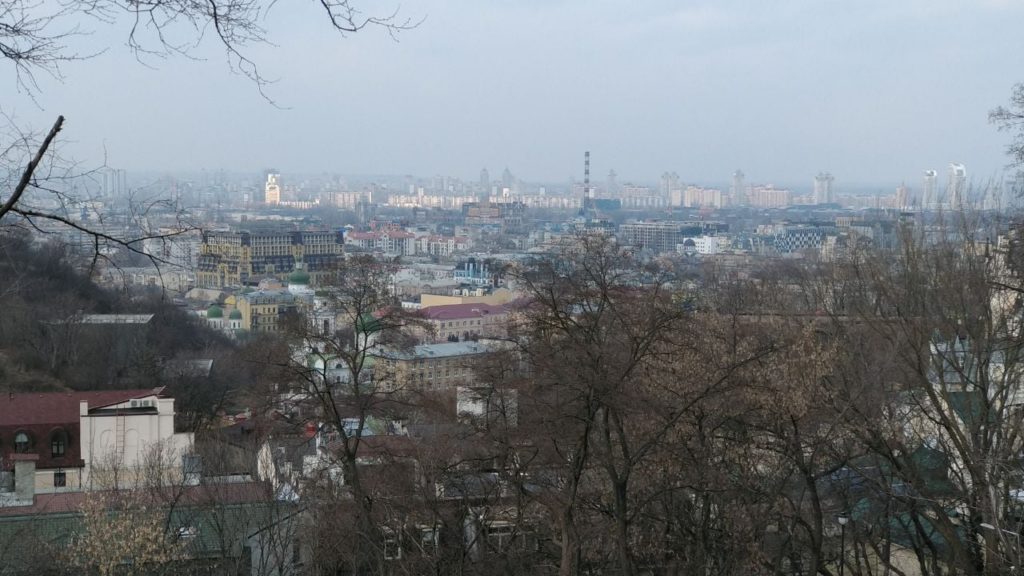Every day my Kyiv is getting better at shooting down missiles with antediluvian anti-aircraft defense systems, sometimes not even bothering to turn on the sirens. It appears the anti-aircrafters have now gotten it down so cold, there’ll just be a loud bang nearby and then a message in the local Telegram channel like, “all clear, it’s just our guys.” At any rate, Kyivans are by now well acquainted with the vocalizations of the machines protecting them.
Open for the second week in a row—and keeping the fighting spirit of Lvivska Square residents afloat—is the city’s best third-wave coffeeshop, which even serves two types of croissants: classic and almond. But you’re only allowed one per person; they sell out quickly, and everyone needs to get one: the national guard from the roadblock nearby, to go with his oat-milk latte; and the female volunteer with her arm in a cast; and the Dutch journalist dispassionately sipping his pour-over over the bangs of the anti-aircraft defense and the wails of the sirens. The barista, meanwhile, speaks Ukrainian to me, russian to the fighter and volunteer, and English to the journalist. Nobody is running for cover—it’s a sunny day, the coffee and croissants are too good, and the russians too ham-fisted.
This giant city, it seems, has converged, braced itself into a barbed sphere—an antitank hedgehog—projecting out:
antitank barriers and concrete roadblocks;
a television tower, which rusnyavoye high-precision weaponry managed to miss, concurrently burning several fucking people in Babiy Yar (including one russian citizen);
the monster building in Podil (but even this I forbid the fascists to touch with their dirty rockets; Kyivans will decide for themselves what to demolish and what to leave standing as a monument to tastelessness and corruption);
Shchekavytsa, with its Old Believer graveyard crosses and the green neon of Ukraine’s main mosque.
Everything is oozing mysticism. Like smoke from the fires in small nearby towns creeps onto Podil and Troyeshchina from the north. Of course, it’s always been here, all one-and-a-half-thousand-and-then-some years. In the place where this photo was taken there is at once a pagan shrine; the ruins of the Church of the Tithes, destroyed, along with tens of thousands of Kyivans, by the horde; and a memorial stone, upon which it states that Kyiv’s defense line passed through here during the last people’s war. It is here that my russian-speaking friend, the granddaughter of a Don Cossack enchantress, comes to sing-sling hexes for the occupants’ demise, in breakthrough Ukrainian. Everyone is speaking of kharakterniks1, witches, molfars2. Magical troops are operating in social networks, all Kyivans and Kyivesses are seeing prophetic dreams, obeying their intuitions, and literally physically feeling time’s flow towards our victory.
Everyone is ready to die. Another friend performed a ritual: when they bombed the outskirts across the woods from Irpin’, she left her house, lay down on the ground, and took death into herself, became them: earth and death. Many Kyivans did just this (maybe not to the letter), many Ukrainians from towns that are quiet and from those of which there is nothing left at all after a systematic annihilation. Everyone here has come to an agreement with death, taken it seriously, released themselves from it, and gotten back to their work. They volunteer, write code, burn russian tanks and the fools inside them.
Only the russians have not been taken seriously here. Everyone is laughing at them, at which they get all huffy, and all that’s small and pitiful in them creeps out. But how can we take seriously those who marauded Bucha, are about to fall into a cauldron3 (which, it is proposed, we should name “Bagatiy”4), to burn alive in their tin cans, but are calling their relatives to find out how much a looted graphics card costs, happy that “the little trip was reimbursed.”
Or those who, fleeing from moscow or st. petersburg (from what?) are whining in Armenia or Georgia that they haven’t created the necessary infrastructure for them, that they’re refusing to house them, in favor of real war refugees. As they themselves, in the meantime, cluster together, like on Brighton Beach, refusing to learn to say “thank you” and “good evening” in the local language. As they are shatteringly confused and crushed by their hypocritical guilt, their petty imperial—I forget the russian word—pyha5 (not to be confused with pihva6, though that’s what’s coming for them).
1 A part-sorcerer, part-warrior Cossack, found only in the Zaporozhian Sich. A soldier-shaman, spiritual leader, keeper of the traditions and secrets of Zaporozhian Cossack martial arts. Cossack Mamay was one example.
2 Hutsul healer, magician.
3 Kettle, pocket. Group of combat forces that have been isolated by opposing forces from their logistical base and other friendly forces.
4 “Rich”, orthography implying a russian accent. To read more about the class axis of the Bucha massacre, let this translator suggest a post by Mykhailo Bogachow.
5 pride
6 Literally: vagina. Figuratively: “they’re fucked”.

